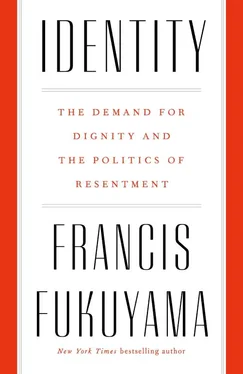Weak national identity has been a major problem in the greater Middle East, where Yemen and Libya have turned into failed states, and Afghanistan, Iraq, and Somalia have suffered from internal insurgency and chaos. Other developing countries have remained more stable, yet remain beset by problems related to a weak sense of national identity. This is the situation throughout sub-Saharan Africa, and it is a major obstacle to development. Countries such as Kenya and Nigeria, for example, are ethnically and religiously divided; stability is maintained only because different ethnic groups take turns in power to loot the country. {1} 1 See Michela Wrong, It’s Our Turn to Eat: The Story of a Kenyan Whistle-Blower (New York: HarperPerennial, 2010). See also Fukuyama, Political Order and Political Decay , 330–32.
High levels of corruption, poverty, and failed economic development are the result.
By contrast, Japan, Korea, and China all had well-developed national identities well before they began to modernize—indeed, prior to their confrontation with the Western powers in the nineteenth century. Part of the reason they have been able to grow in such spectacular fashion in the twentieth and early twenty-first centuries is that they did not have to settle internal questions of identity as they opened up to international trade and investment. They too suffered from civil war, occupation, and division. But they could build on traditions of statehood and common national purpose once these conflicts were stabilized.
National identity begins with a shared belief in the legitimacy of the country’s political system, whether that system is democratic or not. Identity can be embodied in formal laws and institutions that dictate, for example, what the educational system will teach children about their country’s past, or what will be considered an official national language. But national identity also extends into the realm of culture and values. It consists of the stories that people tell about themselves: where they came from, what they celebrate, their shared historical memories, what it takes to become a genuine member of the community. {2} 2 Rogers M. Smith, Political Peoplehood: The Roles of Values, Interests, and Identities (Chicago: University of Chicago Press, 2015).
In the contemporary world, diversity—on the basis of race, ethnicity, religion, gender, sexual orientation, and the like—is both a fact of life and a value. For many reasons it is a good thing for societies. Exposure to different ways of thinking and acting can often stimulate innovation, creativity, and entrepreneurship. Diversity provides interest and excitement. In the year 1970, Washington, D.C., was a rather boring biracial city in which the most exotic food one would dine on was served at the Yenching Palace on Connecticut Avenue. Today, the greater Washington area is home to an incredible amount of ethnic diversity: one can get Ethiopian, Peruvian, Cambodian, and Pakistani food and travel from one small ethnic enclave to another. The internationalization of the city has stimulated other forms of interest: as it becomes a place where young people want to live, they bring new music, arts, technologies, and entire neighborhoods that didn’t exist before. Washington’s story has been replicated in any number of other metropolitan areas around the world, from Chicago to San Francisco to London to Berlin.
Diversity is also critical to resilience. Environmental biologists point out that artificially produced crop monocultures are often highly vulnerable to diseases because the population lacks genetic diversity. Indeed, genetic diversity is the motor of evolution itself, which is based on genetic variation and adaptation. The broad concern over the loss of diversity in species around the world rests on its threat to long-term biological resilience.
Finally, there is the matter of the individual search for identity that we have examined in earlier chapters. People often resist being homogenized into larger cultures, particularly if they were not born into them. They want their specific selves to be recognized and celebrated, not suppressed. They want to feel a connection with their ancestors and know where they came from. Even if they are not part of the culture, they want to hold on to the world’s fast-disappearing indigenous languages, and traditional practices that recall earlier ways of life.
On the other hand, diversity is not an unalloyed good. Syria and Afghanistan are very diverse places, but such diversity yields violence and conflict rather than creativity and resilience. Kenya’s diversity sharpens the divisions between ethnic groups and feeds an inward-looking political corruption. Ethnic diversity led to the breakdown of the liberal Austro-Hungarian Empire in the decades prior to World War I, when its component nationalities decided they could not live together in a common political structure. Fin de siècle Vienna was a melting pot that had produced Gustav Mahler, Hugo von Hofmannsthal, and Sigmund Freud. But when the empire’s narrower national identities—Serbs, Bulgarians, Czechs, and Austro-Germans—asserted themselves, the region descended into a paroxysm of violence and intolerance. {3} 3 For a poignant account of both the richness of pre–World War I Vienna and the tragedy of its collapse, see Stefan Zweig, The World of Yesterday (Lincoln: University of Nebraska Press, 2013).
National identity got a bad name in this period precisely because it came to be associated with an exclusive, ethnically based sense of belonging known as ethno-nationalism. This type of identity persecuted people who were not part of the group and committed aggressions against foreigners on behalf of co-ethnics living in other countries. The problem, however, was not with the idea of national identity itself; the problem was the narrow, ethnically based, intolerant, aggressive, and deeply illiberal form that national identity took.
Things do not have to be this way. National identities can be built around liberal and democratic political values, and the common experiences that provide the connective tissue around which diverse communities can thrive. India, France, Canada, and the United States are examples of countries that have tried to do this. Such an inclusive sense of national identity remains critical for the maintenance of a successful modern political order for a number of reasons.
The first is physical security. The extreme example of what can happen absent national identity is state breakdown and civil war, as in such cases as Syria or Libya, noted above. But short of this, weak national identity creates other serious security issues. Large political units are more powerful than smaller ones and can protect themselves better. They are in a better position to shape the international environment to suit their own interests. Britain, for example, could not have played nearly the same role on the geopolitical stage as it has in the past centuries if Scotland had remained an independent country. The same would be true for Spain if its richest region, Catalonia, seceded. Highly divided countries are weak, which is why Putin’s Russia has provided quiet support to independence movements across Europe and has intervened in American politics to increase the level of political division there. {4} 4 In the wake of President Trump’s embrace of Vladimir Putin, a surprising number of Republicans have developed a favorable view of Russia, with a certain fringe asserting that they would trust Putin more than their fellow Americans who were liberal. Paul Reynolds, a Republican National Committee member from Alabama, was quoted as saying, “If I’ve got a choice of putting my welfare into the hands of Putin or the Washington Post , Putin wins every time.” James Hohmann, “The Daily 202: As Roy Moore Declines to Step Aside, a Tale of Two Republican Parties Emerges,” Washington Post , November 10, 2017; Zack Beauchamp, “Roy Moore Admires Vladimir Putin’s Morality,” Vox , December 8, 2017.
Читать дальше












